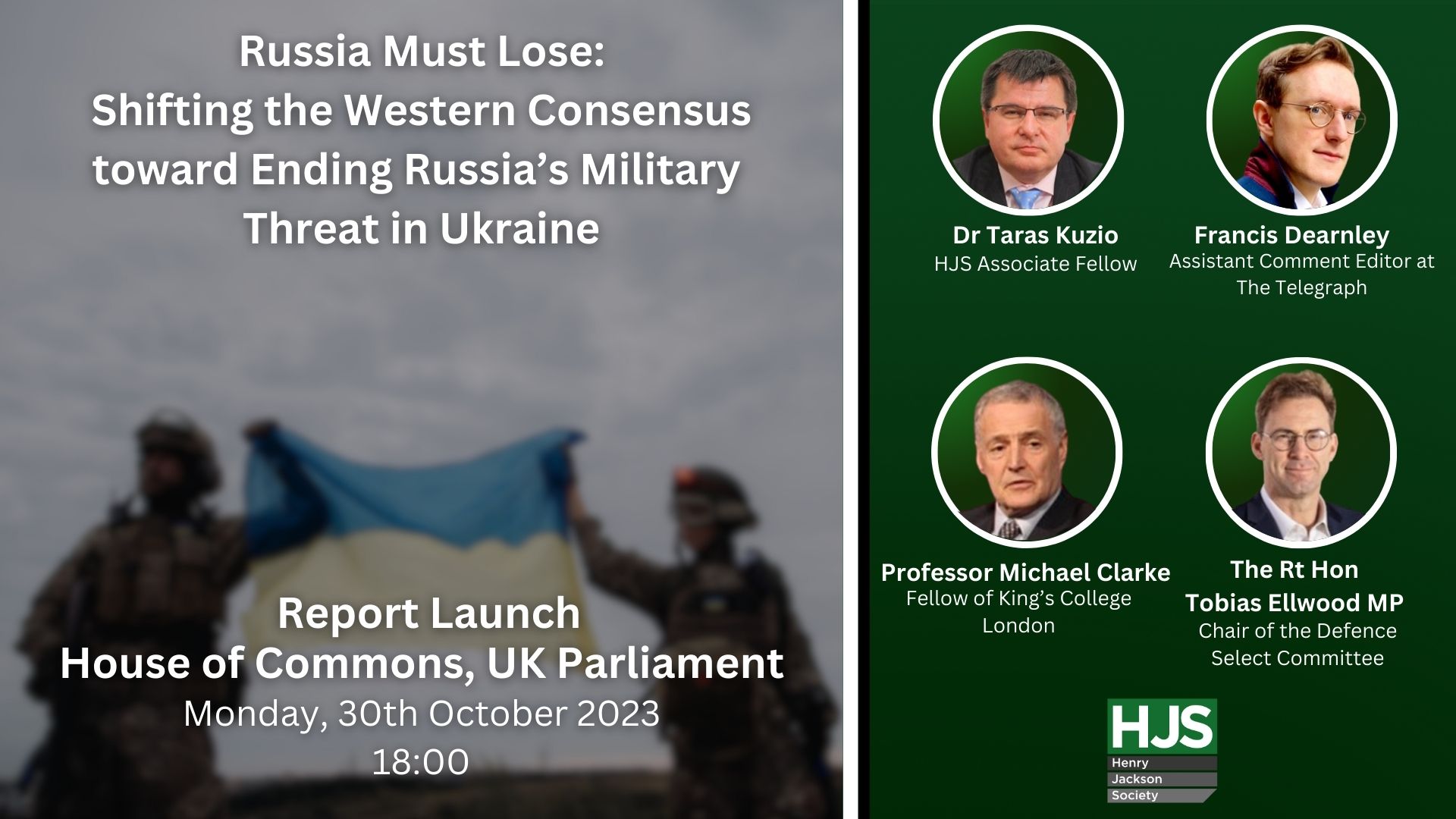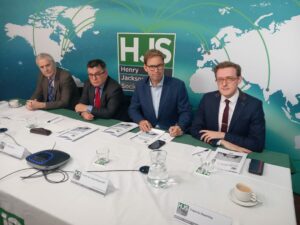Russia Must Lose: Shifting the Western Consensus toward Ending Russia’s Military Threat in Ukraine

- This event has passed.
Russia Must Lose: Shifting the Western Consensus toward Ending Russia’s Military Threat in Ukraine
30th October 2023 @ 6:00 pm - 7:00 pm

The new Cold War pits a Russia-China-Iran-North Korea axis against the West. The goal of this anti-Western axis is the defeat of the US-led unipolar world that has been in place since the end of World War II. Hamas’ recent brutal terrorist attack against Israel, and Iran’s subsequent threats of regional escalation, have brought home the strategic necessity of Western democracies standing together with the clear goal of the military defeat of the anti-Western axis. This wider threat makes it more important than ever to deliver a decisive defeat against Russia, one of the leading members of this new anti-Western axis.
Western governments, NATO, and the EU are divided into doves and hawks in their dealing with Russia’s invasion of Ukraine, with the UK already a leading member of the hawkish camp. Both groups believe Ukraine’s defeat would be disastrous, but only the hawks openly state an additional and equally important goal of the military defeat of Russia.
The division of Western governments into doves and hawks has led to a dangerous lack of clarity over the West’s goals in assisting Ukraine, and the piecemeal supply of military equipment. This gave Russia time to lay mines and build fortifications to thwart Ukraine’s counter offensive. More serious still, the division within the West has led the Kremlin to believe that dragging the war out will eventually lead to a fracture in Western resolve.
The Henry Jackson Society is pleased to gather a panel of experts to discuss its latest report, where its author, Dr Taras Kuzio, provides arguments in support of Western governments, NATO, and the EU uniting to support Russia’s military defeat in Ukraine.

Taras Kuzio is a Professor in the Department of Political Science, National University of Kyiv Mohyla Academy. His previous positions were at the University of Alberta, George Washington University, and University of Toronto, International Institute of Strategic Studies, German Marshall Fund of the US and Foreign Policy Institute, School of Advanced International Studies, Johns Hopkins University. Taras Kuzio is the author and editor of 24 books, including Russian Disinformation and Western Scholarship (2023); Fascism and Genocide: Russa’s War Against Ukrainians (2023); and Russian Nationalism and the Russian-Ukrainian War. Autocracy-Orthodoxy-Nationality(2022). He is the author of five think tank monographs, including The Crimea: Europe’s Next Flashpoint? (2010). He has authored 38 book chapters and over 130 scholarly articles on Soviet, Eurasian, Russian, and Ukrainian politics, national identity, geopolitics, and international relations.

Francis Dearnley is Assistant Comment Editor at the Telegraph. Prior to working as a journalist, he was Chief of Staff to the Chair of the Prime Minister’s Policy Board. He is also one of the core team behind, and a regular contributor to, the Telegraph’s daily podcast ‘Ukraine: The Latest’, which has had over 50 million downloads and was nominated for The Society of Editors’ ‘Podcast of the Year’ award among others. A particular focus in his work is how the past shines a light on the latest diplomatic, political, and strategic developments in geopolitics.

Professor Michael Clarke is a Fellow of King’s College London. He was Director General of the Royal United Services Institute from 2007-2015 and is now a Distinguished Fellow at RUSI. Prior to that he was Professor of Defence Studies at King’s College London, and Deputy Vice-Principal for Research Development. In addition to his Visiting role at KCL he is also a Visiting Professor at the University of Exeter, where he is Associate Director of its Strategy and Security Institute. He is Fellow of the University of Aberystwyth and in 2019 was made a Fellow of the Royal College of Defence Studies.
He was a Specialist Advisor to the House of Commons Defence Committee from 1997 to 2019, and is now Specialist Advisor to the Joint Committee on the National Security Strategy. He has served on the Prime Minister’s Security Forum and the Chief of Defence Staff’s Strategic Advisory Panel.
His most recent books are: The Challenge of Defending Britain, Manchester University Press 2019; Tipping Point: Britain, Brexit and Security in the 2020s, I.B.Tauris 2019 (with Helen Ramscar); and Britain’s Persuaders: Soft Power in a Hard World, I.B.Tauris 2021 (with Helen Ramscar).

The Rt Hon Tobias Ellwood MP is a British Conservative Party politician, soldier and author. He served in the Royal Green Jackets and reached the rank of Captain. He currently serves as the Member of Parliament for Bournemouth East and served as a UK Government Minister at the Ministry of Defence from 2017 to 2019. He has been the chair of the Defence Select Committee since January 2020.
***
EVENT SUMMARY

The Henry Jackson Society was pleased to host an event with Dr Taras Kuzio, Mr Francis Dearnley and Professor Michael Clarke, chaired by The Rt. Hon. Tobias Ellwood MP. The panel was gathered to discuss a report authored by Dr Kuzio, which urged for Western governments, NATO and the EU to militarily defeat the ‘anti-Western axis’. Dr Kuzio started by dividing Western countries into ‘hawks’, those who publicly wish Russia to be militarily defeated, and ‘doves’, who have been reticent to assert this as a goal. Dr Kuzio stressed the need for Ukraine to be given NATO membership to stop a future attack from Russia. He spoke sceptically of Russian peace proposals, and defined victory in the conflict as a return to the 1991 borders.
Professor Clarke suggested that the position the West adopts in relation to Ukraine will reflect its commitment to defending liberal democracy. Mr Dearnley concluded that nations view the Ukraine war through the prism of their own history, which in turn goes some way in explaining the diverse responses to the crisis. He questioned how essential NATO is in deterring a future invasion, invoking the capacity of individual nation-states to provide security guarantees. He cautioned against accepting the Russian rhetoric that Crimea is essential to Russian security. He then spoke of the relationship between Putin and Hamas. Professor Clarke doubted the extent to which the conflict would turn nuclear.
RELATED EVENTS
The Dangers of US Isolationism
In contrast to Western democracies that seek economic growth and peaceful coexistence, a new set of autocrats has emerged, each with their respective territorial ambitions. Three of the most notable powers … Continued
How Mongolia is Transforming into a Beacon for Foreign Direct Investment in East Asia
Lord David Cameron’s April 2024 visit to Mongolia and Central Asia demonstrates the growing importance that London places on protecting and promoting British interests in the Indo-Pacific region. A new report … Continued




